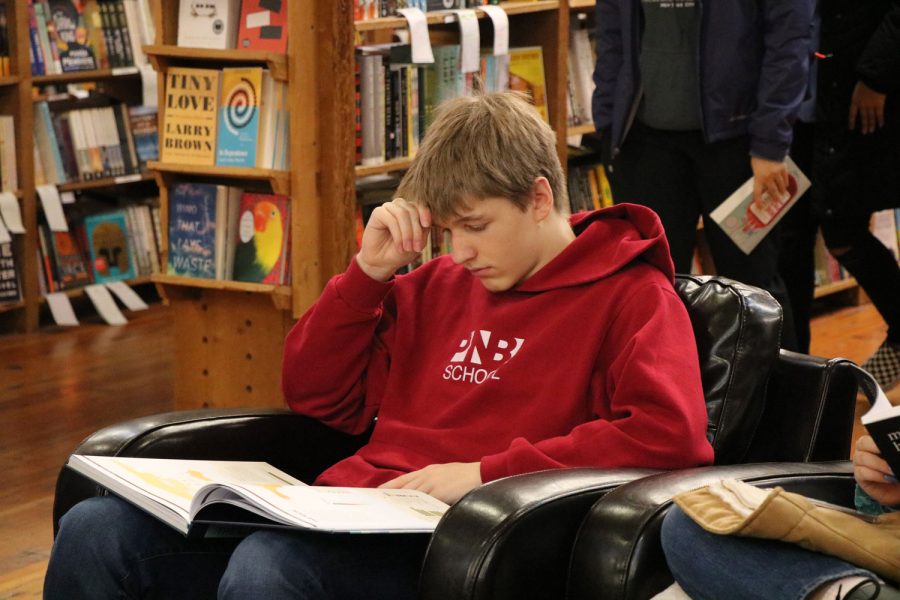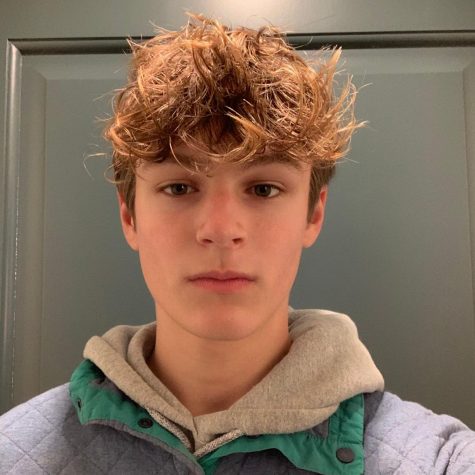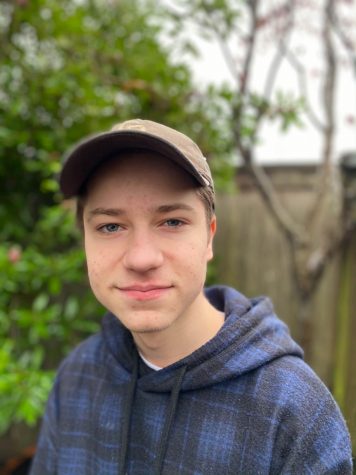UPrep Looks Back On Intensives 3 Years Later
Intensives all day every day
Photo: Matthew Sage
As we near winter break, students and teachers are beginning to prepare for their winter intensive. Being introduced to University Prep just
four years ago, the Puma Press finally decided to look into intensives where they came from.
Looking for an innovative way to strengthen their curriculum, UPrep faculty came across the idea of intensives. After many meetings and surveys, Richard Kassissieh, Assistant Head of School for Academics, realized one of the main issues that they were trying to solve was students’ workload and stress levels.
“Once we had our goals, students were telling us [the past] seven-period days had got to go,” Kassissieh said. “Students said, ‘you know, we’re all struggling in all these different classes, it’s kind of stressful,’ we don’t really get to enjoy our winter break because we still haven’t taken our exams yet.’”
As a result, faculty began to look past their local community and set up the Intensives Design committee to visit other schools and find inspiration. When visiting the Hawken School in Cleveland, Ohio, the committee realized that this program solved many of the issues they were trying to fix.
“Students get to focus on one class instead of constantly juggling a whole bunch of homework,” Kassisseh said. “Part of the feedback we got was that we did a good job of instruction on campus, but we could get off campus more. [Intensives] remove the barriers to getting off campus, remove the barriers to interdisciplinary courses, make it easier to do all those things, and finish the semester before winter break.”
Similarly, in 2016 at the Bay School in San Francisco, a group of teachers including Nettie Kelly, Dean of Academics and Innovation, was struggling with finding ways to get students to learn within time-restricted periods.
“We played around for a couple of years with different types of schedules to try and give teachers and students a way to have just more flexibility in connecting with people outside the building,” Kelly said. “[The intensive program] was ultimately the schedule that we chose.”
Both intensive programs drew on projects and off-campus learning. A goal of this program was to create a more project-based curriculum where students and teachers had the opportunity to dive deep into one subject area.
The Bay School thought that math and science would not work in a project based learning style so they decided to keep their math and sciences as semester formats. Even though UPrep does not offer certain academically intense courses like calculus, physics, chemistry and pre-calculus, they still implemented courses like biology, intro to statistics and geometry.
“For classes like pre-calc, you have to get through a week’s worth of material each day,” Kassissieh said. “But in statistics, you’re doing it more through a project-based learning model, contrary to semesters where you’re doing more tests and quizzes.”
Senior Theo Barton voiced similar concerns, believing all content-heavy courses like math should be taken in a semester format.
Students like senior Kellen Davis, who has taken both the Geometry and Statistics intensive, felt both the benefits and consequences of taking an academic intensive.
“During academic intensives, I have a better grasp on the material since I’m not focusing on learning new material and doing the homework from five other classes,” Davis said. “But I feel like since you are learning the information so quickly the retention of that information is a lot worse in the format of intensives rather than a semester course.”
Sophomore Karan Narasimhan, who also took the geometry intensive, expressed a different type of distaste for content-heavy courses.
“If it’s a course where there is a lot of content and you are forced to learn the whole time, I find myself just sitting in the same place for hours losing focus due to the boredom,” Narasimhan said.
Many students fail to see the abundance of work it takes to teach an intensive. With a need for six hours of content every day for three weeks with no breaks, many teachers find themselves overworked.
English teacher Kim Gonzales felt this pressure when she joined the UPrep community last year and was assigned to help teach both the creative writing and radio lab intensives.
“You’re teaching all day and if you’re teaching writing, you have to have time to read the writing and respond to it. So, if you don’t build in time during the day to do that, you’re working constantly,” Gonzales said. It is not just academic classes that teachers find themselves engulfed with work, visual art teacher Ty Talbot agrees with Gonzales, voicing the effort involved in teaching a class such as painting.
“For those three weeks you’re teaching, it’s pretty intense because you don’t really have prep periods,” Talbot said. “You’re kind of on all day, and even if you take a break and somebody comes in to cover your class, it’s not really a break, you wind up checking email or doing other kinds of administrative things.”
However, teachers’ stress does not dissipate right after their intensive ends. With just a day of transition between the winter intensive and second semester, English teacher Kim Gonzales believes it is difficult to plan.
“You go right from teaching the intensive into teaching something else and then you have another class coming,” Gonzales said. “So if you are teaching an intensive, you kind of have to have your second-semester class dialed in a little bit before the intensive even starts.”
Even with the increased pressure that intensives bring, Gonzales enjoys the freedom it gives to her class.
“We have a lot of time for students to actually dig into whatever they’re doing, shutting out all the other distractions, getting feedback, revising, editing, and really just creating something cool,” Gonzales said. “This is often something that we just don’t have time to do during a 70-minute class.”
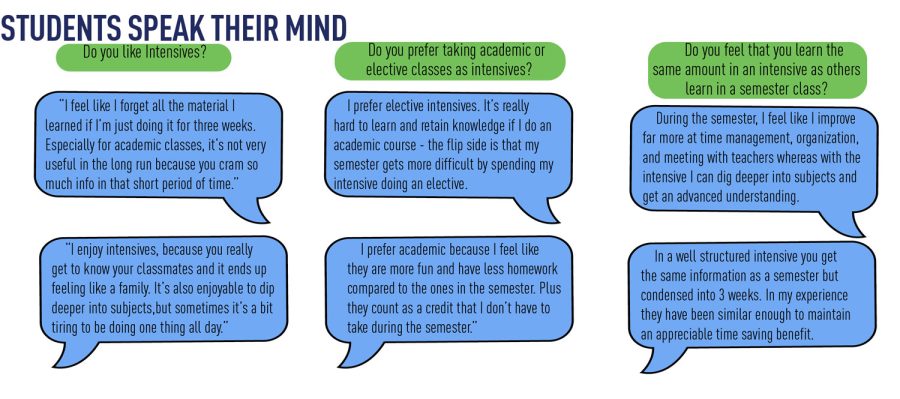
Teachers are not the only ones that enjoy the looser time restraints. Senior Peter McCormick, who took Gonzales’s radio lab-intensive, enjoyed the immersion that the three-week class provides.
“It really gave me the feeling of actually working at a radio station. We were assigned to have a project done by the end of the day, and we had to like four to five hours to record, write, edit, record and produce an entire podcast,” McCormick said. “I thought that was a really well-done way of forcing us to use our time effectively like you would in the real world.” Similarly, Barton, who took Gonzales’s creative writing intensive, expressed his love for the depth that intensives give.
“Six hours of writing a day, although tiring, allows you to devote more time to each step,” Barton said. “When you’re really focused on a few pieces of writing, you’re thinking so much more about them and they develop much quicker than when you have five other periods that you’re also working on.” Junior Ava Durbin cannot be happier with the program. Her favorite intensive has been the humanity intensive since as it captivated her attention throughout the three weeks.
“I really appreciate having intensives as a part of the school year because I love being able to explore a topic in-depth,” Durbin said. “Having time dedicated to one thing has made the experience one that is low stress, and I can ensure that I’m putting my best work into the project that I am doing.”

Surveys show that the implementation of intensives has ultimately been a success.
“Year after year, the student ratings are extremely high. We’re talking about a 90 plus percent satisfaction rate and in my experience, students tend to be pretty critical and have high standards,” Kassissieh said. “90 plus percent blows me away because I’m like, wow, we’re doing something right.”
Even though the feedback has been predominantly positive, there is always room for improvement. Theo Barton thinks that it would be beneficial if there was more communication early on explaining the content of the intensives before deciding which intensive to take.
“I think the intensive preview is fine, but it doesn’t really give people the broad scope,” Barton said. “It would be good for people to do the intensives preview during the sign-up period for classes because I feel like in certain intensive previews, I didn’t really know which intensives I needed to take to balance my out schedule or fill certain requirements.”
As intensives have become a key part of UPrep’s term structure, Kassissieh believes that the intensives program will not undergo any major changes in the near future. However, if there are any changes, they will most likely revolve around the intersection of intensives with other UPrep programs, rather than intensives as a singular focus. For example, there have already been conversations regarding changes in the 11th and 12th-grade elective programs.
“The English teachers are talking about [changing the English electives] and we might see [history teachers] making some small changes in the way that US history is done,” Kassissieh said. “When they decide what they want to change, part of what they’ll have to consider is what does this mean for our English intensives or our US history intensives. I think you’re more likely to see little adjustments to intensives that are really not about intensives, they’re more about the other programs.”
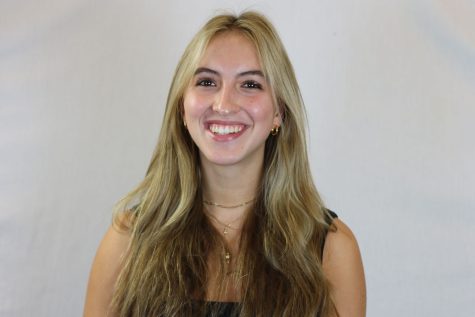
Annabel Wickham is one of the web editors-in-chief of UPrepmedia.com and she has been on staff for three years. Her favorite stories to write are student...



